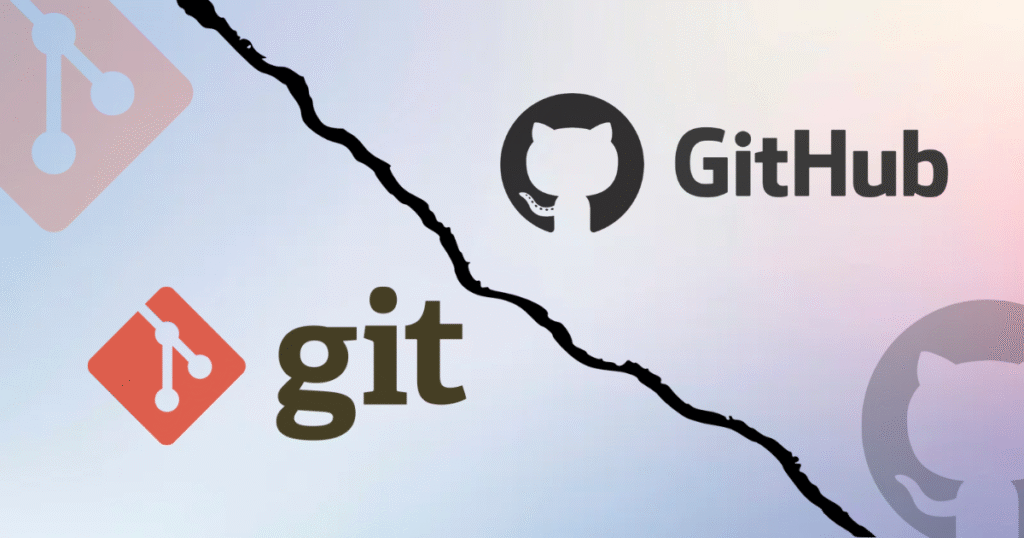Git vs GitHub: Understanding the Key Differences

In the world of software development, Git and GitHub are two terms that often come up, especially when discussing version control and collaborative coding.Although they are interconnected, each serves a unique function. This article dives deep into the differences between Git and GitHub, explaining their functionalities, use cases, and how they complement each other. Whether you’re a beginner or an experienced developer, understanding these tools is essential for efficient project management and collaboration. What is Git? Git is a decentralized version control system created to monitor changes in source code throughout the software development process. Developed by Linus Torvalds in 2005, Git enables multiple developers to collaborate on a project without conflicting changes. It is a command-line tool (though GUI tools exist) that records the history of changes in a project, enabling developers to revert to previous versions, branch out to experiment with new features, and merge changes seamlessly. Key Features of Git Git operates locally on your computer, meaning you don’t need an internet connection to commit changes, create branches, or view project history. It’s a powerful tool for managing code versions, but it lacks a centralized platform for collaboration unless paired with a hosting service. What is GitHub? GitHub is a cloud-based platform that hosts Git repositories, making it easier for teams to collaborate on projects.Introduced in 2008, GitHub enhances Git’s version control system with features such as remote repository hosting, collaboration tools, and an intuitive interface. It’s widely used by developers, open-source contributors, and businesses to manage codebases, track issues, and automate workflows. Key Features of GitHub Unlike Git, GitHub requires an internet connection to access repositories and use its features. It’s not a version control system itself but a platform that enhances Git’s capabilities for collaborative development. Git vs GitHub: The Key Differences To clarify the distinction, here’s a breakdown of the key differences between Git and GitHub: Aspect Git GitHub Definition A distributed version control system designed to track changes in code. A cloud platform designed for hosting and collaborating on Git repositories Functionality Manages code versions locally using commands like commit, branch, and merge. Offers a user interface for handling repositories, collaboration, and automation Usage Command-line tool (or GUI clients) installed on your computer. A browser or GitHub Desktop can be used to access this web-based platform. Internet Dependency Works offline; no internet required for local operations. An internet connection is needed to access repositories and their features. Collaboration Limited to local sharing or manual repository syncing. Enables seamless collaboration with pull requests, issues, and team tools. Cost Free and open-source. Available for free with public repositories; paid plans are offered for private repositories and additional features. Storage Stores repositories locally on your machine. Stores repositories in the cloud. How Git and GitHub Work Together Git and GitHub are vital tools that collaborate to enhance modern software development workflows. Local Work with Git: A developer uses Git on their computer to create a repository, commit changes, and manage branches. For example, they might use commands like:git init git add . This synergy allows developers to leverage Git’s powerful version control locally while using GitHub’s collaboration and hosting features to work as a team. Why Use Git and GitHub? Benefits of Git Benefits of GitHub Common Use Cases Git Use Cases GitHub Use Cases Alternatives to GitHub While GitHub is the most popular platform for hosting Git repositories, alternatives exist: Both platforms offer unique advantages, but GitHub’s vibrant community and extensive ecosystem often make it the preferred option for developers. Getting Started with Git and GitHub Setting Up Git Set up Git: Configure your name and email for commit identification.git config –global user.name “Your Name” Setting Up GitHub Link Local and Remote: Connect your local Git repository to GitHub using:git remote add origin <repository-URL> Best Practices for Using Git and GitHub Conclusion To summarize, Git is a version control system that tracks local code changes, whereas GitHub is a platform that hosts Git repositories and facilitates collaboration. Together, they provide a robust toolkit for developers, ensuring effective version control and smooth teamwork. By understanding their differences and leveraging their strengths, you can streamline your development workflow and contribute to projects of any scale. Whether you’re working solo or with a team, mastering Git and GitHub is a valuable skill in today’s tech landscape. Start experimenting with Git locally, explore GitHub’s collaborative features, and join the global developer community to take your coding journey to the next level.
